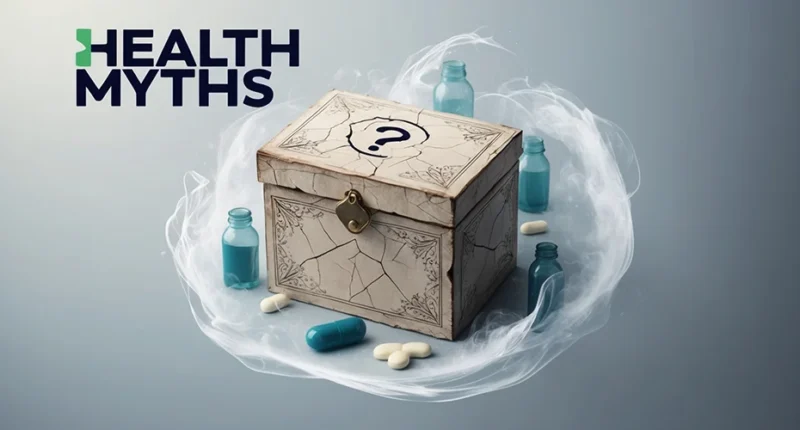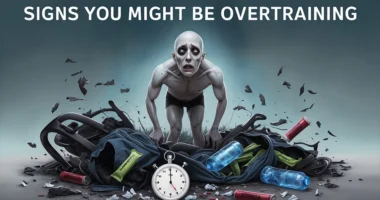Table of Contents
- Myth 1: “You Need to Drink 8 Glasses of Water a Day”
- Myth 2: “Carbs Are Bad for You”
- Myth 3: “You Should Never Eat After 8 PM”
- Myth 4: “You Can Spot Reduce Fat”
- Myth 5: “Detox Diets Are Necessary”
- Myth 6: “Eating Fat Makes You Fat”
- Myth 7: “Vitamins Are All You Need for Good Health”
- Myth 8: “You Should Avoid All Sugary Foods”
- Myth 9: “More Exercise Is Always Better”
- Myth 10: “Mental Health Issues Are Just in Your Head”
- Conclusion
Health myths are everywhere. Whether it’s from friends, family, or even the internet, there are plenty of misconceptions about health and wellness. These myths can lead to confusion, poor health choices, and even fear. In this article, we’ll clear up some of the most common health myths and explain the truth behind them.
Myth 1: “You Need to Drink 8 Glasses of Water a Day”
It’s a widely known belief that you should drink eight 8-ounce glasses of water each day, but this isn’t necessarily true for everyone. The amount of water you need depends on factors like your age, activity level, and climate. While staying hydrated is important, your body gets water from many sources, including food like fruits and vegetables. So, rather than focusing on a specific number, it’s better to drink when you’re thirsty and pay attention to your body’s signals.
Myth 2: “Carbs Are Bad for You”
Many people believe that carbohydrates are unhealthy and should be avoided, especially when trying to lose weight. However, not all carbs are the same. Carbs are a primary energy source for your body, and whole grains, fruits, and vegetables are excellent sources of healthy carbs. The key is to focus on complex carbs, like brown rice and whole-wheat bread, rather than refined carbs, like sugary snacks and white bread. Cutting out all carbs can actually be harmful in the long run, as your body needs them for energy.
Myth 3: “You Should Never Eat After 8 PM”
A common myth is that eating late at night leads to weight gain. While it’s true that eating large meals before bed might make it harder to digest, simply eating after 8 PM doesn’t cause weight gain. What matters most is your total calorie intake over the day, rather than the time you eat. If you’re hungry at night, it’s okay to have a light snack. Just be mindful of portion sizes and the types of food you’re eating.
Myth 4: “You Can Spot Reduce Fat”
Many people believe that by targeting certain areas of the body, like doing crunches to get rid of belly fat, they can lose fat in those specific areas. Unfortunately, spot reduction is a myth. Your body loses fat as a whole, not just from the part you’re working out. So while exercises like crunches are great for building muscle, they won’t directly burn belly fat. The best way to lose fat is through a combination of healthy eating, full-body workouts, and regular cardio.
Myth 5: “Detox Diets Are Necessary”
The idea that your body needs a special detox program to clear out toxins is a myth. Your body already has an amazing system in place for detoxification. Your liver, kidneys, and digestive system naturally work to eliminate toxins from your body. While drinking water and eating a balanced diet filled with fruits, vegetables, and fiber can help support these processes, there’s no need for expensive detox products or fad diets. Focus on eating whole, nutritious foods for overall health.
Myth 6: “Eating Fat Makes You Fat”
Fat has been demonized in the past as a major cause of weight gain, but not all fats are bad. In fact, healthy fats, like those found in avocados, nuts, and olive oil, are essential for your body’s function. These fats help with nutrient absorption, hormone production, and brain health. The problem comes when you eat too many unhealthy fats, like trans fats and saturated fats found in fried foods and processed snacks. Moderation is key when it comes to fats.
Myth 7: “Vitamins Are All You Need for Good Health”
Taking vitamins might seem like an easy way to improve your health, but they should never replace a balanced diet. Vitamins and supplements can be helpful in some situations, such as if you’re deficient in certain nutrients, but they can’t provide all the benefits of a healthy, whole-food diet. The best way to get your vitamins and minerals is through a varied diet that includes fruits, vegetables, lean proteins, and whole grains.
Myth 8: “You Should Avoid All Sugary Foods”
It’s true that too much sugar is harmful to your health and can lead to weight gain, type 2 diabetes, and other issues. However, it’s unrealistic to think you should avoid all sugar. The key is moderation. Eating a small amount of sugar in the form of fruit, dark chocolate, or other treats is fine as part of a balanced diet. The real problem comes from consuming large amounts of refined sugars found in processed foods and sugary drinks. Focus on limiting these and choose healthier alternatives.
Myth 9: “More Exercise Is Always Better”
While exercise is essential for good health, more isn’t always better. Over-exercising can lead to burnout, injuries, and even negative effects on your immune system. Rest and recovery are just as important as working out, so it’s important to listen to your body and give yourself time to rest between workouts. Aim for a balanced exercise routine that includes strength training, cardio, and flexibility exercises, along with adequate recovery time.
Myth 10: “Mental Health Issues Are Just in Your Head”
Mental health issues, such as depression, anxiety, and stress, are often misunderstood. It’s a common myth that people can simply “snap out of it” or that mental health problems aren’t real. The truth is, mental health issues are just as real as physical health problems, and they can have a significant impact on a person’s well-being. Seeking help from a therapist, counselor, or doctor is a key step in managing mental health, and it’s important to take these issues seriously.
Conclusion
There are many health myths out there, but it’s important to separate fact from fiction. By being more informed about these common misconceptions, we can make better decisions about our health and well-being. Remember, the key to a healthy life is balance, moderation, and taking care of both your body and mind.











